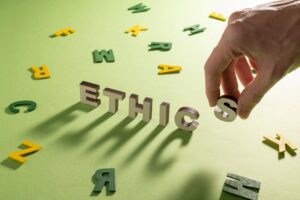Why Ethics Should Be the Centerpoint of Everything
Ethics, a moral compass guiding our actions and decisions, is an indispensable element in shaping a just, equitable, and ethical sustainable world. It serves as the bedrock of human society, influencing everything from personal relationships to worldwide policies.
Ethics and Society
A society built on ethical principles is one where individuals are treated with dignity and respect. Ethical frameworks provide a moral blueprint for laws, policies, and social norms. By adhering to ethical standards, we can prevent discrimination, corruption, and other societal ills. For instance, the civil rights movement was fueled by a deep-seated belief in the ethical principle of equality.
Ethics and Individual Well-being
Ethical behavior is not merely a societal obligation; it is also a personal virtue. Individuals who act ethically often experience greater happiness, fulfillment, and peace of mind. Integrity, a cornerstone of ethical conduct, fosters trust and strengthens relationships. When we make ethical choices, we build a positive reputation and enhance our credibility.
Ethics and Environmental Sustainability
The environmental crisis we face today underscores the urgent need for ethical considerations. Sustainable development, which aims to meet the needs of the present without compromising future generations, is rooted in ethical principles. More ethical practices, such as reducing waste, conserving resources, and supporting sustainable businesses, contribute to a healthier Earth.

Dilemmas and Decision-Making
Sometimes ethical dilemmas arise when individuals are faced with difficult choices that involve conflicting moral values. These dilemmas can occur in various contexts, from personal relationships to professional settings. Ethical frameworks, such as utilitarianism, deontology, and virtue ethics, provide tools for navigating these complex situations.
Leadership
Ethical leadership is essential for fostering a positive and productive work environment. Leaders should set high standards of behavior, encourage open communication, and promote fairness and justice. They inspire their employees to act with integrity and make ethical decisions, even in challenging circumstances.
The Ethical Implications of Technology
The rapid advancement of technology has raised numerous ethical questions. Artificial intelligence, for example, has the potential to revolutionize various industries, but it also poses risks to privacy, security, and job displacement. Ethical guidelines are necessary to ensure that technology is developed and used responsibly.
In conclusion, ethics is not a mere theoretical concept; it is a practical guide for living a meaningful and fulfilling life. By prioritizing ethical principles, we can create a better future for ourselves and generations to come.
Societal Ethical Dilemmas
Here are some pressing societal ethical dilemmas:
Artificial Intelligence and Automation
- Job Displacement: As AI and automation advance, many jobs are becoming obsolete. How do we ethically address mass unemployment and economic inequality?
- Bias and Discrimination: AI algorithms can perpetuate biases present in the data they are trained on. How can we ensure AI systems are fair and unbiased?
- Autonomous Weapons: The development of autonomous weapons raises concerns about accountability and the potential for unintended harm. Should we ban autonomous weapons or regulate their use?
Nature and Environmental Ethics
- Intergenerational Justice: What obligations do we have to future generations when it comes to environmental preservation?
- Resource Scarcity: How do we allocate scarce resources like water and energy in a fair and equitable manner?
Surveillance and Privacy
- Mass Surveillance: The increasing use of surveillance technologies raises concerns about privacy and civil liberties. How can we balance security needs with individual privacy?
- Data Privacy: How can we protect personal data from breaches and misuse, especially in the age of big data and the internet of things?
These are just a few examples of the complex ethical dilemmas facing society today. As technology advances and societal values evolve, new challenges will continue to emerge.
Conclusion: Ethics, the Silent Guardian
Ethics, often described as the moral compass guiding our actions, is not merely a theoretical concept but a practical guide for living a meaningful and fulfilling life. It is the silent guardian that ensures we do the right thing, even when no one is watching. By prioritizing ethical principles, we can build a more just, equitable, and sustainable world.
Whether it's making a tough decision in a personal relationship, acting with integrity in a professional setting, or advocating for social justice, ethics provides a framework for navigating complex moral dilemmas. It empowers us to make choices that align with our values and contribute to the greater good.
As we face the challenges of the 21st century, it is imperative that we embrace ethical principles as a cornerstone of our lives. By doing so, we can create a future where humanity thrives and where the well-being of all is prioritized.
